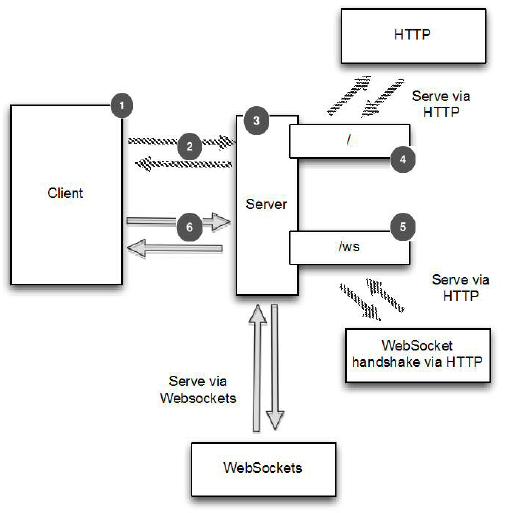我们的WebSocket 示例应用程序
场景
为了让示例应用程序展示它的实时功能,我们将通过使用WebSocket 协议来实现一个基于浏览器的聊天应用程序,就像你可能在Facebook 的文本消息功能中见到过的那样。
我们将通过使得多个用户之间可以同时进行相互通信,从而更进一步。
图12-1 说明了该应用程序的逻辑:
(1)客户端发送一个消息;
(2)该消息将被广播到所有其他连接的客户端。
流程

1 客户端/用户连接到服务器,并且是聊天的一部分
2 聊天消息通过 WebSocket 进行交换
3 消息双向发送
4 服务器处理所有的客户端/用户
这正如你所想的聊天室的工作方式:每个人都可以跟其他人聊天。
此例子将仅提供服务器端,浏览器充当客户端,通过访问网页来聊天。正如您接下来要看到的,WebSocket 让这一切变得简单。
添加 WebSocket 支持
在从标准的HTTP或者HTTPS协议切换到WebSocket时,将会使用一种称为升级握手机制。
因此,使用WebSocket的应用程序将始终以HTTP/S作为开始,然后再执行升级。这个升级动作发生的确切时刻特定于应用程序;它可能会发生在启动时,也可能会发生在请求了某个特定的URL之后。
我们的应用程序将采用下面的约定:如果被请求的 URL 以 /ws 结尾,那么我们将会把该协议升级为WebSocket;否则,服务器将使用基本的HTTP/S。
在连接已经升级完成之后,所有数据都将会使用WebSocket 进行传输。
图12-2 说明了该服务器逻辑,一如在Netty 中一样,它由一组ChannelHandler 实现。
我们将会在下一节中,解释用于处理HTTP 以及WebSocket 协议的技术时,描述它们。
流程图

1 客户端/用户连接到服务器并加入聊天
2 HTTP 请求页面或 WebSocket 升级握手
3 服务器处理所有客户端/用户
4 响应 URI / 的请求,转到 index.html
5 如果访问的是 URI /ws ,处理 WebSocket 升级握手
6 升级握手完成后 ,通过 WebSocket 发送聊天消息
示例代码
服务器
- WsServer.java
package com.github.houbb.netty.inaction.chap12.ws;
import io.netty.bootstrap.ServerBootstrap;
import io.netty.channel.ChannelFuture;
import io.netty.channel.EventLoopGroup;
import io.netty.channel.nio.NioEventLoopGroup;
import io.netty.channel.socket.nio.NioServerSocketChannel;
import java.net.InetSocketAddress;
/**
* @author binbin.hou
* @since 1.0.0
*/
public class WsServer {
public static void main(String[] args) {
final int port = 8989;
ServerBootstrap serverBootstrap = new ServerBootstrap();
EventLoopGroup bossGroup = new NioEventLoopGroup();
EventLoopGroup workerGroup = new NioEventLoopGroup();
serverBootstrap.group(bossGroup, workerGroup)
.channel(NioServerSocketChannel.class)
.childHandler(new WsServerInitializer());
ChannelFuture channelFuture = serverBootstrap.bind(new InetSocketAddress(port)).syncUninterruptibly();
if(!channelFuture.isSuccess()) {
channelFuture.cause().printStackTrace();
} else {
System.out.println("Server listen on port: " + port);
}
channelFuture.channel().closeFuture().syncUninterruptibly();
//close group
bossGroup.shutdownGracefully();
workerGroup.shutdownGracefully();
}
}
- WsServerInitializer.java
package com.github.houbb.netty.inaction.chap12.ws;
import io.netty.channel.Channel;
import io.netty.channel.ChannelInitializer;
import io.netty.channel.ChannelPipeline;
import io.netty.channel.socket.SocketChannel;
import io.netty.handler.codec.http.HttpObjectAggregator;
import io.netty.handler.codec.http.HttpServerCodec;
import io.netty.handler.codec.http.websocketx.TextWebSocketFrame;
import io.netty.handler.codec.http.websocketx.WebSocketServerProtocolHandler;
import io.netty.handler.stream.ChunkedWriteHandler;
/**
* @author binbin.hou
* @since 1.0.0
*/
public class WsServerInitializer extends ChannelInitializer<SocketChannel> {
@Override
protected void initChannel(SocketChannel ch) throws Exception {
ChannelPipeline pipeline = ch.pipeline();
// webSocket 是 http 协议的升级
pipeline.addLast(new HttpServerCodec())
//避免大文件写入 oom
.addLast(new ChunkedWriteHandler())
//使用对象聚合
.addLast(new HttpObjectAggregator(64*1024));
//ws://server:port/context_path
//ws://localhost:9999/ws
//参数指的是contex_path
pipeline.addLast(new WebSocketServerProtocolHandler("/ws"))
// 自定义的 frame 文本处理 handler
.addLast(new TextWebSocketFrameHandler());
}
}
- TextWebSocketFrameHandler
package com.github.houbb.netty.inaction.chap12.ws;
import io.netty.channel.Channel;
import io.netty.channel.ChannelHandlerContext;
import io.netty.channel.SimpleChannelInboundHandler;
import io.netty.handler.codec.http.websocketx.TextWebSocketFrame;
import java.time.LocalDateTime;
/**
* @author binbin.hou
* @since 1.0.0
*/
public class TextWebSocketFrameHandler extends SimpleChannelInboundHandler<TextWebSocketFrame> {
@Override
protected void channelRead0(ChannelHandlerContext ctx, TextWebSocketFrame msg) throws Exception {
//1. 读取客户端的内容
Channel channel = ctx.channel();
System.out.println(channel.remoteAddress()+": " + msg.text());
//2. 服务端反馈内容
ctx.writeAndFlush(new TextWebSocketFrame("Server: " + LocalDateTime.now()));
}
@Override
public void handlerAdded(ChannelHandlerContext ctx) throws Exception {
System.out.println("[客户端加入] " + ctx.channel().id().asLongText());
}
@Override
public void handlerRemoved(ChannelHandlerContext ctx) throws Exception {
System.out.println("[客户端移除] " + ctx.channel().id().asLongText());
}
}
客户端
<!DOCTYPE html>
<html>
<head>
<meta charset="UTF-8">
<title>Socket</title>
<script type="text/javascript">
var websocket;
//如果浏览器支持WebSocket
if(window.WebSocket){
websocket = new WebSocket("ws://localhost:8989/ws"); //获得WebSocket对象
//当有消息过来的时候触发
websocket.onmessage = function(event){
var respMessage = document.getElementById("respMessage");
respMessage.value = respMessage.value + "\n" + event.data;
}
//连接关闭的时候触发
websocket.onclose = function(event){
var respMessage = document.getElementById("respMessage");
respMessage.value = respMessage.value + "\n断开连接";
}
//连接打开的时候触发
websocket.onopen = function(event){
var respMessage = document.getElementById("respMessage");
respMessage.value = "建立连接";
}
}else{
alert("浏览器不支持WebSocket");
}
function sendMsg(msg) { //发送消息
if(window.WebSocket){
if(websocket.readyState == WebSocket.OPEN) { //如果WebSocket是打开状态
websocket.send(msg); //send()发送消息
}
}else{
return;
}
}
</script>
</head>
<body>
<form onsubmit="return false">
<textarea style="width: 300px; height: 200px;" name="message"></textarea>
<input type="button" onclick="sendMsg(this.form.message.value)" value="发送"><br>
<h3>信息</h3>
<textarea style="width: 300px; height: 200px;" id="respMessage"></textarea>
<input type="button" value="清空" onclick="javascript:document.getElementById('respMessage').value = ''">
</form>
</body>
</html>
测试
- 页面打开 index.html
可以打开多个,在输入框发送信息,可以接收到服务器的反馈。
关闭代表移除当前连接。
- 服务端
Server listen on port: 8989
[客户端加入] d89c67fffe99d9d7-00004978-00000001-089a4fe674c43c6c-f4e6a557
/0:0:0:0:0:0:0:1:59205: 啊啊啊
/0:0:0:0:0:0:0:1:59205: 啊啊啊,hello
[客户端加入] d89c67fffe99d9d7-00004978-00000002-21719b08d4c491ad-9373573f
/0:0:0:0:0:0:0:1:59214: 222
[客户端移除] d89c67fffe99d9d7-00004978-00000001-089a4fe674c43c6c-f4e6a557
[客户端移除] d89c67fffe99d9d7-00004978-00000002-21719b08d4c491ad-9373573f
核心内容讲解
WEBSOCKET 帧
WebSocket 以帧的方式传输数据,每一帧代表消息的一部分。一个完整的消息可能会包含许多帧
由IETF 发布的WebSocket RFC,定义了6 种帧,Netty 为它们每种都提供了一个POJO 实现。
表12-1 列出了这些帧类型,并描述了它们的用法。
帧 类 型 描 述
BinaryWebSocketFrame 包含了二进制数据
TextWebSocketFrame 包含了文本数据
ContinuationWebSocketFrame 包含属于上一个BinaryWebSocketFrame或TextWebSocketFrame 的文本数据或者二进制数据
CloseWebSocketFrame 表示一个CLOSE 请求,包含一个关闭的状态码和关闭的原因
PingWebSocketFrame 请求传输一个PongWebSocketFrame
PongWebSocketFrame 作为一个对于PingWebSocketFrame 的响应被发送
我们的聊天应用程序将使用下面几种帧类型:
-
CloseWebSocketFrame;
-
PingWebSocketFrame;
-
PongWebSocketFrame;
-
TextWebSocketFrame。
TextWebSocketFrame 是我们唯一真正需要处理的帧类型。
为了符合WebSocket RFC,Netty 提供了 WebSocketServerProtocolHandler 来处理其他类型的帧。
Handler 及其职责
ChannelHandler 职 责
HttpServerCodec 将字节解码为HttpRequest、HttpContent 和LastHttpContent。并将HttpRequest、HttpContent 和LastHttpContent 编码为字节
ChunkedWriteHandler 块写入一个文件的内容
HttpObjectAggregator 将一个HttpMessage 和跟随它的多个HttpContent 聚合为单个FullHttpRequest 或者FullHttpResponse(取决于它是被用来处理请求还是响应)。安装了这个之后,ChannelPipeline 中的下一个ChannelHandler 将只会收到完整的HTTP 请求或响应
HttpRequestHandler 处理FullHttpRequest(那些不发送到/ws URI 的请求)
WebSocketServerProtocolHandler 按照WebSocket 规范的要求,处理WebSocket 升级握手、PingWebSocketFrame 、PongWebSocketFrame、CloseWebSocketFrame
TextWebSocketFrameHandler 处理TextWebSocketFrame 和握手完成事件
Netty 的WebSocketServerProtocolHandler 处理了所有委托管理的WebSocket 帧类型以及升级握手本身。
如果握手成功,那么所需的ChannelHandler 将会被添加到ChannelPipeline中,而那些不再需要的ChannelHandler 则将会被移除。
当WebSocket 协议升级完成之后,WebSocketServerProtocolHandler 将会把HttpRequestDecoder 替换为WebSocketFrameDecoder,把HttpResponseEncoder 替换为WebSocketFrameEncoder。
为了性能最大化,它将移除任何不再被WebSocket 连接所需要的ChannelHandler。
参考资料
《Netty in Action》 P185
- other
